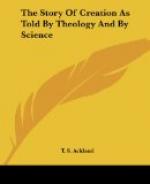But it is said that the moral and intellectual faculties which man possesses, and which he looks upon as the great badge of his superiority, are in truth only different in degree and not in kind from those possessed by the lower animals. But the grounds on which this assertion is based are wonderful in their tenuity. Dogs are possessed of self-consciousness because they sometimes emit sounds in their sleep from which it is concluded that they dream. [Footnote: Descent of Man, vol. i. p. 62.] “Can we feel sure that an old dog, with an excellent memory, and some power of imagination, as shown by his dreams, never reflects on his past pleasures in the chace? And this would be a form of self-consciousness.” Our duty to our neighbour is entirely the result of “social instinct,” [Footnote: Descent of Man, vol. i. pp. 70- 106.] and our duty to our God the development of a belief which has its origin in dreams. [Footnote: Ibid, p. 66.]
It is impossible for us satisfactorily to meet these assertions with a direct negative, [Footnote: There are some who think that this statement may be directly refuted. Their views will be found in the quarterly REVEIW, July, 1871.] for this simple reason, that we have no means whatever of knowing what ideas are present in the minds of the lower animals, or even what communications pass between them. For anything we can tell to the contrary, the bark of a dog may be as articulate to his fellow-dogs as our speech is to our fellow-men, while on the other hand to the dog our speech may be as inarticulate as his bark is to us. But our total ignorance of the mental state of animals which have been the companions of man from the very earliest ages, our utter inability to hold any conversation with them, is in itself a proof of the wide gulf that separates them from us. Put two men of the most widely separated races on a desert isle together, and a very little time will elapse before they are able to hold some communication with each other. If then the difference between man and the lower animals were a difference of the same kind as that between the civilized man and the savage, though greater in degree, surely in so many thousand years something might have been done to open a way for intellectual communication; some development of the faculties of the lower creatures would have been perceived, some means of interchanging ideas would have been discovered. If Mr. Darwin had had for his companions on board the “Beagle,” instead of three Fuegians, as many Gorillas or Chimpanzees, would he, at the end of the voyage, have been able to report any approximation, at all to European mental characteristics, or even to those of the lowest savage? But if the difference be only one of degree, some approximation ought to have taken place.




